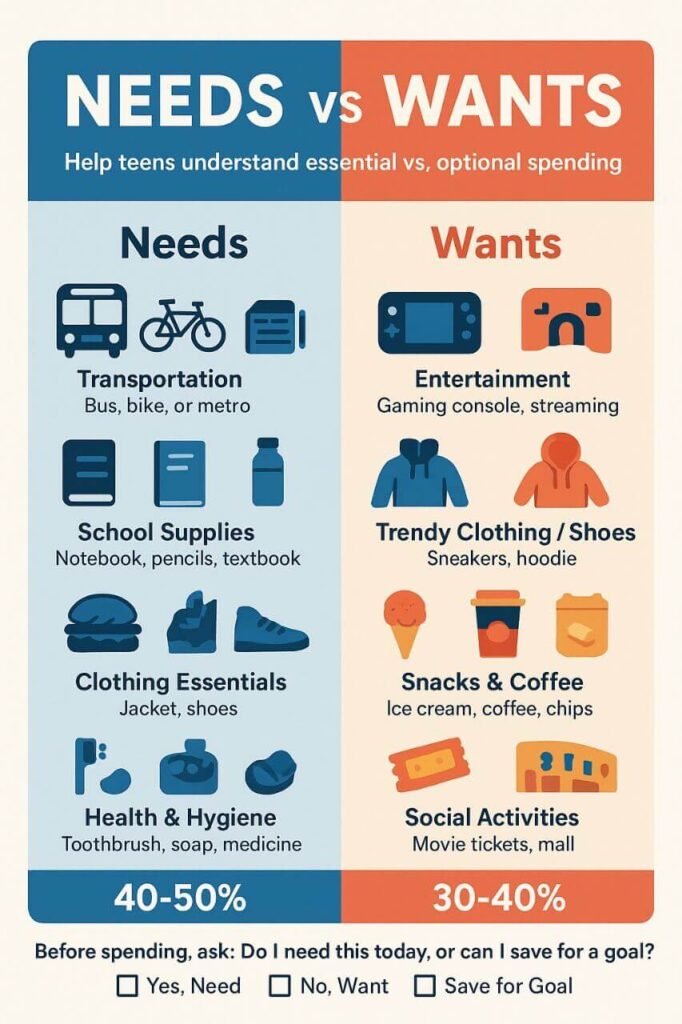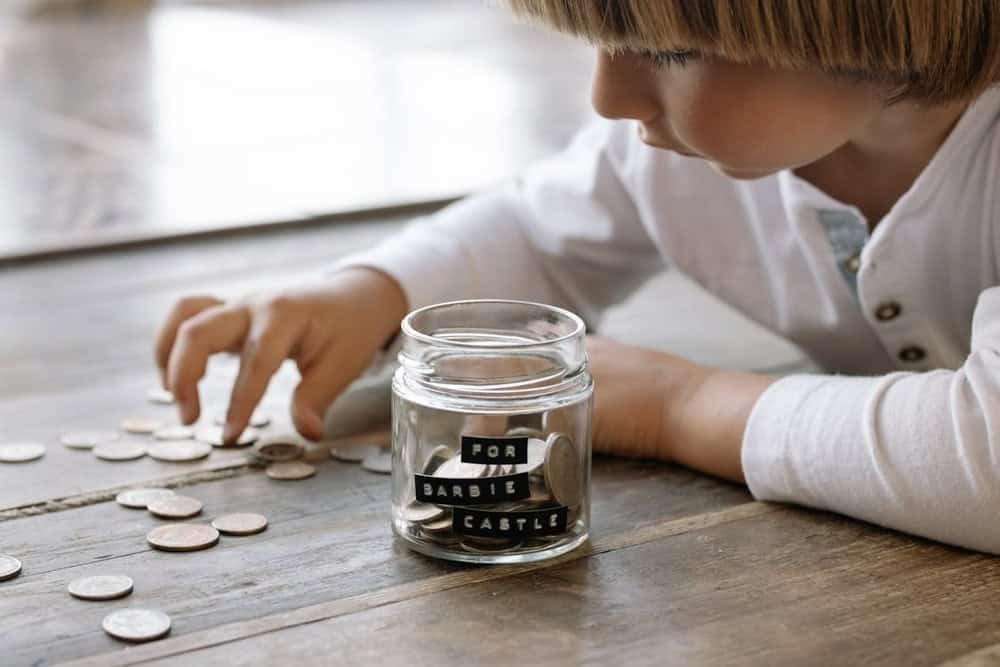Things to Save Up for as a Teenager
Why does it matter what teenagers spend your money on?
When teens receive an allowance, it gives them a chance to learn the value of money from an early age. Using a prepaid debit card helps teenagers spend more responsibly, giving them real-life experience in handling funds.
Many young people make small mistakes at first, but these financial mistakes are valuable lessons that help them avoid bigger problems when they are older. Over time, they learn to be more responsible, build smart spending habits, and avoid wasting their hard-earned money.
Understanding what spending really means and the importance of spending wisely during childhood prepares teens to handle financial responsibility in adulthood with confidence.

What to think about when saving up for things
Good saving habits start with having a clear savings goal. Teens who build the habit of regularly setting money aside show that they consider important points when managing their finances. Developing this mindset early on gives them a strong foundation for bigger financial decisions later in life.
Their wants versus needs
Many teens are still learning about saving and how to distinguish between wants and needs. It’s crucial to understand that needs are necessary items like food and shelter, which must be taken care of first. Wants, on the other hand, are extras such as sweets, magazines, or toys. Recognizing the difference helps teenagers make smarter saving choices and prioritize what matters most.

How long they’ll need to save for
Before deciding to save for something, teens should think about the cost and consider how long it will take to save the money they need. This helps them decide how much money to put into their savings. If they want an item sooner, they will have to think strategically and set aside more regularly. This kind of planning encourages discipline and patience.
Their other money financial responsibilities
Managing money well also involves understanding responsibilities. Teens may need to contribute to living costs at home, save for paying driving lessons, college tuition, or fees for important items. Setting the right priority ensures they stay on track with their goals while managing different financial needs at once.
Where to put their savings
A teen can keep their cash saving in many ways. While young children may use a piggy bank, older teens might use a kids account like GoHenry to stash their savings. Whether the child is aged six or a teenager setting up savings goals, having a proper place to store money encourages better saving habits and gives them a sense of control.

Parental permission
Even when teens save diligently, sometimes they need their parents’ green light before they can buy a particular item. This is especially true for expensive purchases. Without proper communication, a teen might end up disappointed after saving for months, only to discover they are not allowed to buy it. Clear understanding helps avoid frustration and builds trust between parents and teens
20 Short-term saving ideas
- Clothes
- Footwear
- LEGO sets
- Bike
- Smartwatch
- Books and magazines
- Holiday spending money
- Console games
- Entertainment subscription services
- Hobby lessons (singing, musical instrument, horse riding, sports, etc.)
- Music downloads
- Going out with friends
- Birthday and Christmas presents
- Prom outfit
- Concert tickets
- Watching sports
- Musical instruments and accessories
- Charity donations
- Hairdresser
- Beauty treatments
20 Long-term saving ideas
- Driving course
- First car
- Car insurance
- College tuition
- Living expenses at college
- College books, equipment, and resources
- Tutoring
- Moving out of home costs
- Deposit for their first apartment
- Furniture and accessories
- Games console
- Mobile phone
- Laptop or tablet
- Television
- Traveling abroad
- Job interview clothes
- Gym membership
- Investments
- An emergency fund
- Retirement fund (it’s never too early to start thinking about it)

Tips for Saving Up for Things as a Teen
Saving money can feel difficult in the beginning, especially if you haven’t done it before. The things a 13-year-old wants to save for can be very different from what a 16-year-old might aim for, but the skills needed are the same. Starting early as a teen can ensure that you build good money management skills for the rest of your life.
This is a skill with lifetime value, and developing it now gives you a strong foundation for your future. If you’re looking for things to save up for as a teenager but don’t know where to start, these tips will help guide you in the right direction.
How Much Do You Need?
To build smart financial habits as a teen, you first need to work out what you truly need. Think about what you want to save for and how much you must reach that goal. Once you set a clear goal, you can see how much to save per month to make steady progress. When you finally reach your goal, don’t stop there — keep going and let your savings grow over time. This consistent effort turns small amounts into meaningful achievements.

Start Small
When you begin your saving journey, it’s important to set realistic savings goals. If you aim too high, you might feel disheartened and give up quickly. A smart approach is to start small and choose an amount that suits your situation. Pick a lower-cost item that has caught your eye and build from there. Don’t leave yourself short, and remember to enjoy your money while developing a sustainable habit.
Make a Budget
Making a budget is one of the best ways to manage your money effectively. You can divide your income between essential payments, then save the rest for a rainy day. By knowing how much is left each month, you can enjoy your spending without worrying about overspending. Following helpful tips on budgeting allows teens to stay in control of their finances and reach their savings goals faster.
Be Patient
The process may feel tedious at times as you wait for your savings to build, but being patient is key. It’s incredibly rewarding to reach your goals and know that you’ve been responsible with your money to buy what you truly want. Patience helps teenagers stay focused and disciplined during their saving journey.
Use Your Student Discount
One of the best ways to save is to pay less for the same things. Many shops and restaurants offer student discount programs that help you spend less and save more. Making use of these opportunities allows teens to get what they need while keeping more money in their savings.
Cancel Any Subscriptions
Sometimes, forgotten subscriptions keep eating away at your savings. Please verify whether you have subscribed to any services that may have been overlooked, or if a free trial has concluded.
That £10 you were spending on a subscription can be put towards something you really want. Reviewing these regularly helps you maintain a tight budget and stay focused on your goals.
Hang Out at Home
Instead of going out all the time, you can host game nights or movie nights at home. This way, you still have fun with friends while saving money. By helping each other, you and your friends can enjoy memorable moments without overspending, supporting one another’s savings goals.
Last Greetings 😩
Saving is a great way to build a strong financial habit as a teen. When you prioritize what you truly need over what you want, everything becomes smooth and steady, like sailing on calm waters. This approach gives you better financial security and helps you manage your money wisely.
By setting aside funds for essential and daily spending, you make space to also enjoy moments that matter in life. Life can be funny sometimes and has its own way of throwing unexpected surprises at you now and again.
Money-Saving Related Posts
Plan smarter, save faster, and hit your goals with these guides:

